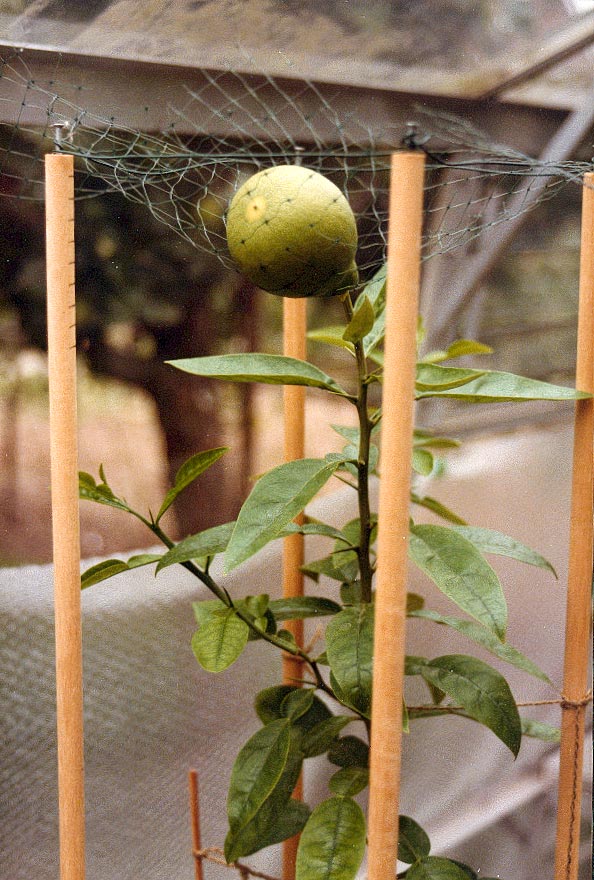| Author |
Message |
Lemandarangequatelo
Citruholic


Joined: 01 Mar 2010
Posts: 485
Location: UK
|
| Posted: Thu 10 Jun, 2010 1:56 pm |
|
Hello Everyone,
I'm a new citrus collector and enthusiast and I'm attemping my first hybridization of citrus. I'm crossing pomelo with Royal Kumquat.
The type of pomelo is unknown, I bought the seed on ebay from Belize. The pomelo seedlings are only 1 year old and one of them produced a flower. I had to take advantage of this stroke of good luck to attempt a citrus hybrid. The only other citrus tree I had which was also in flower was a small Royal Kumquat tree (produced by Oscar Tintori). I waited for a kumquat flower to newly open then I removed the stamen before they could set any pollen and put the pomelo pollen onto the stigma. I then put some gauze over the flower to protect it from cross pollination.
The fruit has set and there is a fruitlet growing. Hopefully I might get more than 2 seeds from the fruit and with any luck some pomeloquat seedlings! In the many years to come I'll keep you informed of the possible pomeloquat's progress, I wish citrus grew faster lol.
Is there a good website or pdf that anyone knows of that covers citrus hybridization well?
Many thanks to the other forum members who have posted their hybrid attempts and hybridization advice, much appreciated.
Lemandarangequatelo |
|
| Back to top |
|
 |
citrange
Site Admin


Joined: 24 Nov 2005
Posts: 590
Location: UK - 15 miles west of London
|
| Posted: Thu 10 Jun, 2010 6:29 pm |
|
A single flower on one year old Pummelo and Grapefruit seedlings is infrequent but not exactly rare.
I have only once managed to grow a small fruit from such a seedling.
You will find that the fruit quickly grows too heavy for the plant, and it will need some kind of support to prevent breaking. Here was my arrangement:

By the way, I've never heard of Royal Kumquat. Can you describe it or post a picture?
Mike/Citrange |
|
| Back to top |
|
 |
Lemandarangequatelo
Citruholic


Joined: 01 Mar 2010
Posts: 485
Location: UK
|
|
| Back to top |
|
 |
citrange
Site Admin


Joined: 24 Nov 2005
Posts: 590
Location: UK - 15 miles west of London
|
| Posted: Fri 11 Jun, 2010 6:00 am |
|
The depressed apex of the fruit, and its size, suggests to me that this is a Fukushu Kumquat, Fortunella obovata. |
|
| Back to top |
|
 |
Lemandarangequatelo
Citruholic


Joined: 01 Mar 2010
Posts: 485
Location: UK
|
| Posted: Fri 11 Jun, 2010 10:46 am |
|
| citrange wrote: | | The depressed apex of the fruit, and its size, suggests to me that this is a Fukushu Kumquat, Fortunella obovata. |
It's not Fortunella Obovata because Oscar Tintori citrus nursery that produced the tree lists Fortunella Reale (Royal) seperately from Obovata. Upon closer inspection they also list the Marumi seperately, so my guess was also wrong. Looks like the Reale is a kumquat type only Oscar Tintori have. Link below:
http://www.oscartintori.it/eng/indice.html |
|
| Back to top |
|
 |
Skeeter
Moderator

Joined: 23 Jul 2006
Posts: 2218
Location: Pensacola, FL zone 9
|
| Posted: Fri 11 Jun, 2010 1:59 pm |
|
Getting back to your attempt to hybridize, is royal kumquat a mono-embryonic variety--if not, most of the seedlings will be clones of the mother plant.
_________________
Skeet
 |
|
| Back to top |
|
 |
Lemandarangequatelo
Citruholic


Joined: 01 Mar 2010
Posts: 485
Location: UK
|
| Posted: Fri 11 Jun, 2010 2:10 pm |
|
| Skeeter wrote: | | Getting back to your attempt to hybridize, is royal kumquat a mono-embryonic variety--if not, most of the seedlings will be clones of the mother plant. |
Hi Skeeter, thanks for commenting. I have no idea if they are monoembryonic or not. I'm trying to germinate 7 seeds as we speak but so far they refuse to sprout (they were stored in the fridge for weeks, maybe that killed them?). If they do sprout I'll be sure to post here if they are monoembryonic or not.
If they are polyembryonic is the probability of a hybrid very low? I wish I had a pomelo tree too use as the mother but unfortunately I have to wait for my seedlings to grow. |
|
| Back to top |
|
 |
Skeeter
Moderator

Joined: 23 Jul 2006
Posts: 2218
Location: Pensacola, FL zone 9
|
| Posted: Fri 11 Jun, 2010 3:10 pm |
|
Polyembryonic seeds indicate that the mother plant is producing clones which are identical copies of the mother plant. That does not mean that an occasional zygotic embryo is not possible, but they will likely be few and far between--identifiable by the fact that they are different from most of the seedlings.
You can peel the seed and see if you see multiple embryos--if you are careful that can be used to speed up sprouting.
_________________
Skeet
 |
|
| Back to top |
|
 |
Sylvain
Site Admin


Joined: 16 Nov 2007
Posts: 790
Location: Bergerac, France.
|
| Posted: Fri 11 Jun, 2010 7:23 pm |
|
In the "catalogue de la pépinière St Georges" it is said to be a Fortunella Margarita but the fruit does'n look like one. |
|
| Back to top |
|
 |
Lemandarangequatelo
Citruholic


Joined: 01 Mar 2010
Posts: 485
Location: UK
|
| Posted: Fri 11 Jun, 2010 9:12 pm |
|
| Skeeter wrote: | Polyembryonic seeds indicate that the mother plant is producing clones which are identical copies of the mother plant. That does not mean that an occasional zygotic embryo is not possible, but they will likely be few and far between--identifiable by the fact that they are different from most of the seedlings.
You can peel the seed and see if you see multiple embryos--if you are careful that can be used to speed up sprouting. |
I just checked the seeds, they were all moldy except one unfortunately. The one that isn't moldy appears to be monoembryonic. |
|
| Back to top |
|
 |
Lemandarangequatelo
Citruholic


Joined: 01 Mar 2010
Posts: 485
Location: UK
|
| Posted: Fri 11 Jun, 2010 9:18 pm |
|
| Sylvain wrote: | | In the "catalogue de la pépinière St Georges" it is said to be a Fortunella Margarita but the fruit does'n look like one. |
Hi Sylvain. I agree it doesn't look like Fortunella Margarita Nagami. |
|
| Back to top |
|
 |
citrange
Site Admin


Joined: 24 Nov 2005
Posts: 590
Location: UK - 15 miles west of London
|
| Posted: Sat 12 Jun, 2010 6:09 am |
|
In Tintori's list the variety is noted with 'ISA'.
This is the Italian citrus research institute in Sicily previously called Instituto Sperimentale Agrumicoltura (ISA) but officially now Centro di Ricerca per l'Agrumicoltura (CRA).
They have distributed budwood to Italian citrus growers from varieties that they have researched and proved to have good results. However, they do not include a 'Kumquat Reale' in their current variety list.
They do list a 'Mandarino Reale' which happens to actually be a Fortunella hindsii hybrid, but I still think that Lemandarinoquats plant is Fortunella obovata.
See
http://www.agrumicoltura.it/public/Img/113_Kumquat%20a%20frutto%20grande%20e%20obovato.pdf and
http://www.agrumicoltura.it/public/Img/121_Mandarino%20Reale.pdf
Mike/Citrange |
|
| Back to top |
|
 |
Lemandarangequatelo
Citruholic


Joined: 01 Mar 2010
Posts: 485
Location: UK
|
| Posted: Sat 12 Jun, 2010 6:24 am |
|
| citrange wrote: | In Tintori's list the variety is noted with 'ISA'.
This is the Italian citrus research institute in Sicily previously called Instituto Sperimentale Agrumicoltura (ISA) but officially now Centro di Ricerca per l'Agrumicoltura (CRA).
They have distributed budwood to Italian citrus growers from varieties that they have researched and proved to have good results. However, they do not include a 'Kumquat Reale' in their current variety list.
They do list a 'Mandarino Reale' which happens to actually be a Fortunella hindsii hybrid, but I still think that Lemandarinoquats plant is Fortunella obovata.
See
http://www.agrumicoltura.it/public/Img/113_Kumquat%20a%20frutto%20grande%20e%20obovato.pdf and
http://www.agrumicoltura.it/public/Img/121_Mandarino%20Reale.pdf
Mike/Citrange |
Interesting how citrus are sometimes hard to identify. I just hope this Reale is monoembryonic and gives me some nice pomeloquat hybrids. I'm hoping for a kumquat the size of a small orange that tastes great and you can eat whole  |
|
| Back to top |
|
 |
Skeeter
Moderator

Joined: 23 Jul 2006
Posts: 2218
Location: Pensacola, FL zone 9
|
| Posted: Sat 12 Jun, 2010 10:31 pm |
|
If it is mono-embryonic, your chances of getting a hybrid are good. Not to talk you out of your goal, but your next big hurdle is getting a useful and productive variety. Your chances are low and it will take years to even find out what you have, but I do wish you luck.
As for getting your seeds to sprout, I like to place them on a saucer with a moist paper towel and cover the saucer with plastic wrap. Place the saucer in a warm place (about 85 F or 30 C). As soon as you see a root--transfer to the potting media.
_________________
Skeet
 |
|
| Back to top |
|
 |
Lemandarangequatelo
Citruholic


Joined: 01 Mar 2010
Posts: 485
Location: UK
|
| Posted: Sat 12 Jun, 2010 11:14 pm |
|
| Skeeter wrote: | If it is mono-embryonic, your chances of getting a hybrid are good. Not to talk you out of your goal, but your next big hurdle is getting a useful and productive variety. Your chances are low and it will take years to even find out what you have, but I do wish you luck.
As for getting your seeds to sprout, I like to place them on a saucer with a moist paper towel and cover the saucer with plastic wrap. Place the saucer in a warm place (about 85 F or 30 C). As soon as you see a root--transfer to the potting media. |
Thanks very much for the info, good wishes and germinating advice. I don't mind the long wait or low probability of success, I just find it fascinating and fun to do. I'll be a citrus grower for life now I think, so plenty of time to experiment with hybridizing. I'm trying to find a pomelo tree to buy here in the UK to increase my chances of making a hybrid but no luck yet. What other types are also monoembryonic but easier to find? Is there a good website, pdf or book that lists them along with hybridization info and advice? |
|
| Back to top |
|
 |






























